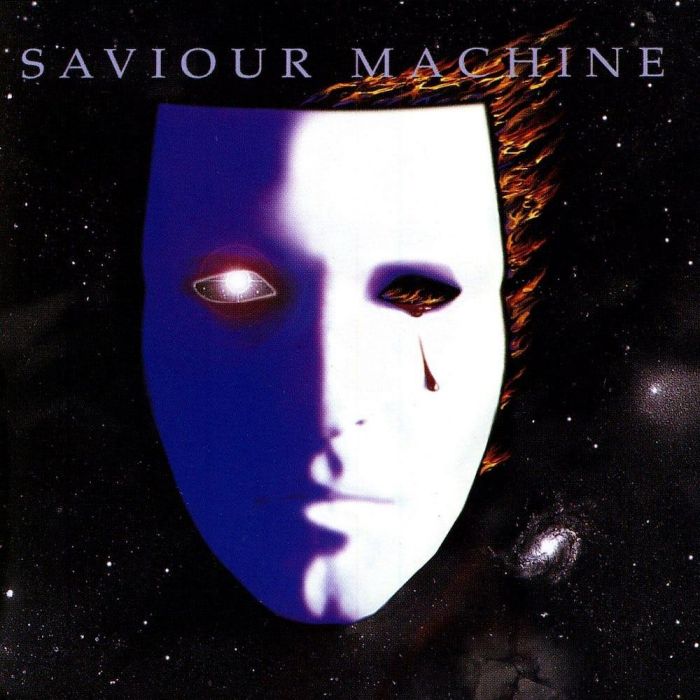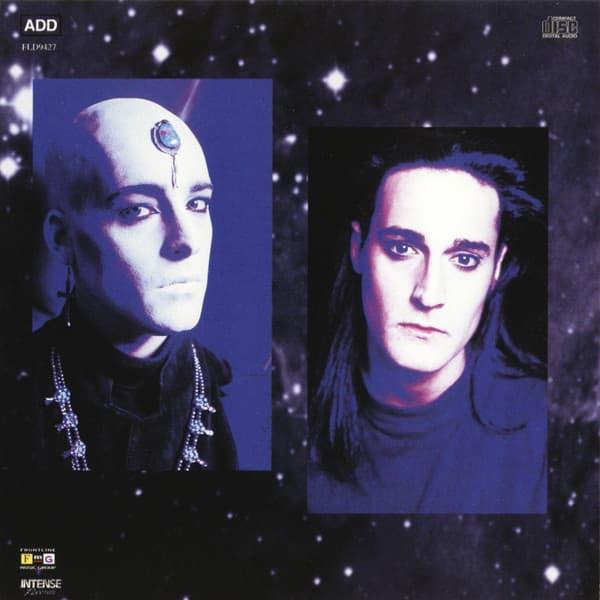30 Years Ago, Saviour Machine Unleashed Their Apocalypse on Christian Metal (Review)

I doubt I’m the only person who got hooked on Saviour Machine before hearing even a single riff or solo. All it took was one look at frontman Eric Clayton’s theatrical appearance — white face paint, dark robes, and best of all, a huge jewel in the middle of his forehead — to know that they were the real deal.
Fortunately, their blend of goth, metal, and classical music ably lived up to the promise of Clayton’s appearance. Jeff Clayton’s graceful riffing on “Carnival of Souls,” “Legion,” and “The Mask,” along with bassist Dean Forsyth and drummer Samuel West (who I knew from Scaterd Few’s classic Sin Disease), easily bridged the gaps between those genres. And when the band explored Metallica-like thrash on “Force of the Entity” and “Christians and Lunatics,” they did so in an elegant and refined manner thanks to Rob Watson’s keyboards and arrangements.
And of course, there was Eric Clayton’s voice.
Clayton’s deep baritone evoked the specters of Andrew Eldritch (The Sisters of Mercy) and Wayne Hussey (The Mission) while possessing an operatic flair that proved absolutely necessary for his lyrical ambitions. Given his appearance, there’s no way Clayton would possibly deign to sing about the usual rock n’ roll topics. Rather, his lyrics drew from Revelation’s bizarre imagery to focus on spiritual warfare, demonic activity, government conspiracy, and the end of time itself.
To be fair, this sort of stuff was pretty common for Christian metal of the late ’80s and early ’90s. (Look no further than the cover of Deliverance’s Weapons of Our Warfare or Mortification and Vengeance Rising’s catalogs.) But none of those bands had a dude in face paint with a jewel on his forehead singing “Naked she lies on the crucifix crying/The tears of the innocent die/The dragon slides between her thighs” or “She drinks the blood of prophets/And she drinks the blood of saints/Between her legs they crawl in torment/For the souls they lay to waste.”
(Despite being obvious references to Revelation 12:1 – 6 and 17:1 – 6, that imagery still led to Saviour Machine being banned in some Christian bookstores for being too provocative. The fact that the band took their name from a David Bowie song undoubtedly raised a few eyebrows, as well.)

Depending on your preferred eschatological framework, Saviour Machine’s aesthetic can be kind of silly and overwrought, but Clayton’s voice possesses so much dramatic heft and conviction that it doesn’t really matter. He sings as if he’s God’s own herald sent to warn the world of the coming apocalypse — and you believe him, even if you gave up dispensational premillennialism ages ago. That same conviction also makes possible some surprisingly sensitive performances on the album’s final songs, “A World Alone” and “Jesus Christ.”
The former is a string-drenched ballad that laments a decaying civilization — Clayton sings about “a world that’s drowning in its lies/Which persecutes his brother/For the color of his eyes” and also “radiates the skies [and] intoxicates the oceans” — even as it looks forward to its destruction. The latter yearns for Christ’s return and wrestles with the paradoxes He represents (“You are the reason for the wars that plague the land/You are the symbol for the cause in which they stand… Are you are the man who said to turn the other cheek?/Are you the one for this appears to be the weak?”) before imploring Him to bring about a new world free from hatred, pain, suffering, and war.
Clayton’s fascination/obsession with the end times would fully manifest in the Legend series of albums that Saviour Machine released in the late ’90s and early ’00s. The series was never completed, however, due to Clayton eventually becoming overwhelmed by the project’s ambition and scale. (Legend was billed as “the unofficial soundtrack for the end of the world.”) The end result was Saviour Machine’s inevitable dissolution after one last concert in Mexico City in 2004.
Label woes (Massacre Records released the final Legend album in 2011 without the band’s permission), health issues, and personal problems ultimately led to Clayton retreating from music altogether post-Saviour Machine. But in 2017, he reunited with his brother Jeff to record a David Bowie tribute album and in 2020, he released a solo autobiographical concept album titled A Thousand Scars. As for Saviour Machine, the Clayton brothers reunited with several original members in 2018 and recorded some new songs. The reunion has been on hiatus since 2020, however, as the Claytons et al. focus on other projects. (Clayton did shave his beard and don his trademark Saviour Machine get-up, complete with forehead jewel, for a short performance of his solo material at the 2021 Brainstorm Festival in the Netherlands.)
Regardless of their future, Saviour Machine’s 1993 debut left a considerable mark on the Christian music scene, and its reputation has only grown over the ensuing years. Saviour Machine has appeared on several “best of Christian metal” lists while garnering considerable acclaim beyond the usual Christian circles, as well. And I know it certainly made an impression on me.
Along with Mortal, The Prayer Chain, and The Violet Burning, Saviour Machine challenged the religious framework of my youth. (Which is somewhat ironic because their focus on the end times was right in line with the eschatology of my childhood church.) Although I no longer subscribe to that particular view of the Rapture, I have no problem getting caught up in Saviour Machine’s music as soon as I hear “Carnival of Souls”’s thunderous opening and cascading riffs.
On a side note, Saviour Machine’s debut is a fascinating snapshot of a particular segment of the Christian music industry that existed in the ’90s.
For starters, it was produced by Terry Taylor (Daniel Amos), who was the go-to producer for a slew of indie, alternative, and metal artists during this time period, including Christafari, DigHayZoose, Mortal, and the aforementioned Scaterd Few. It was mixed by Gene Eugene (Adam Again) and Bob Moon, both of whom would later work on a number of classic Tooth & Nail releases from Havalina Rail Co., Joy Electric, MxPx, Plankeye, and Starflyer 59.
One of the album’s guest vocalists was Riki Michele, who also sang in Adam Again and recorded several solo albums. Keyboardist Rob Watson performed on albums by Ric Alba, Randy Stonehill, The Violet Burning, and The Waiting. Finally, the album’s artwork was designed by Joe Potter, who also designed albums for Jyradelix, Mad at the World, and Mike Stand as well as D-Boy Rodriguez and E-Rock. (Given their considerable project overlap, I can only imagine the running jokes as Taylor et al. kept bumping into each other on the same albums.)
In other words, Saviour Machine’s debut featured the talents of a bunch of decidedly non-metal folks (with the notable exception of Deliverance’s Jimmy Brown, who also sang on the album). But such was the strange, insular alternate dimension that was non-CCM Christian music in the ’90s.
This might just be the nostalgia talking, but so many of the usual boundaries and limits surrounding genres just didn’t seem to exist back then. Or perhaps more accurately, the distinctions of who the “right” people were to work on specific genres were far less defined. (Perhaps the closest modern equivalent is The National’s Aaron Dessner working with Taylor Swift.) Or maybe everybody knew everybody back then and Taylor, Eugene, et al., were just really cheap and affordable. In any case, this mix of insularity and “porous-ness” is one of the things that fascinates me the most about this particular era of Christian music — an era the likes of which we’ll probably never experience ever again.